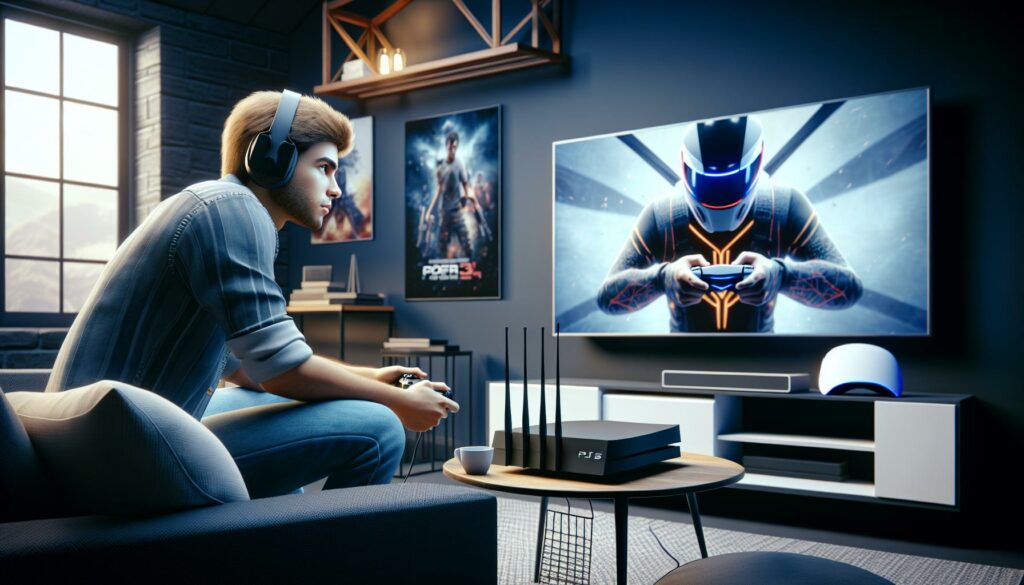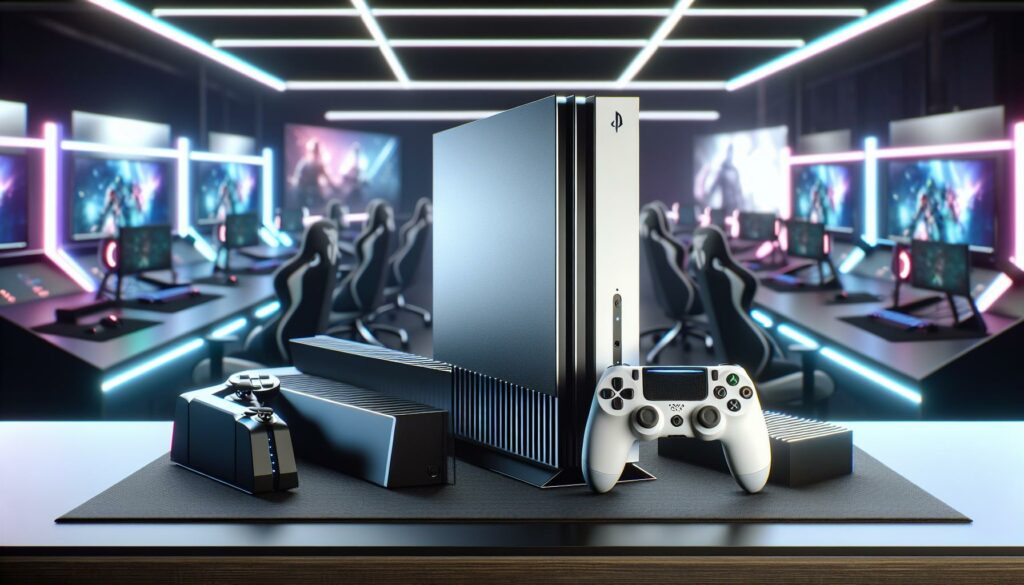As a PS5 owner myself, I know how crucial it is to have a stable internet connection for downloading games, playing online, and accessing streaming services. Getting your PS5 connected to the internet is a straightforward process but it’s essential to know the right steps.
Whether you prefer a reliable wired connection or the convenience of Wi-Fi, I’ll walk you through both methods to get your console online. I’ve helped countless gamers troubleshoot their connectivity issues, and I’ll share my expert tips to ensure you’re up and running in no time. From navigating the PS5’s network settings to choosing the best connection type for your setup, I’ve got you covered.
- Choose between wired (Ethernet) or wireless (Wi-Fi) connections – wired offers better speeds up to 1000 Mbps and lower latency for competitive gaming
- Connect your PS5 to the internet by navigating to Settings > Network > Settings > Set Up Internet Connection, then follow the prompts for either wired or wireless setup
- Test your connection through Settings > Network > Connection Status to verify speeds, NAT type, and packet loss metrics
- Optimize performance by using custom DNS servers (like Google’s 8.8.8.8 or Cloudflare’s 1.1.1.1) and enabling QoS settings in your router
- Troubleshoot common issues by checking cable connections, updating router firmware, enabling UPnP, and forwarding necessary PS5 ports
How to Get to Internet on PS5
PS5’s network setup offers two primary connection methods: wired (Ethernet) and wireless (Wi-Fi). I’ll guide you through selecting the right option and completing the connection process.
Choosing Between Wired and Wi-Fi Connection
A wired connection delivers superior performance for PS5 gaming with speeds up to 1000 Mbps. Here’s how each option compares:
| Feature | Wired Connection | Wi-Fi Connection |
|---|---|---|
| Speed | Up to 1000 Mbps | Up to 866 Mbps |
| Latency | 1-5ms | 10-30ms |
| Stability | Consistent | Variable |
| Interference | None | Moderate |
Key factors to consider:
- Choose wired for competitive gaming or large downloads
- Select Wi-Fi for flexible setup locations
- Pick wired for streaming in 4K resolution
- Opt for Wi-Fi when router access is limited
- Connect an Ethernet cable to:
- PS5’s LAN port (rear panel)
- Router’s available Ethernet port
- Navigate PS5 settings:
- Press PlayStation button
- Select Settings (gear icon)
- Choose Network
- Select Settings
- Pick “”Set Up Internet Connection””
- Configure connection:
- Select LAN cable option
- Enable DHCP for automatic IP
- Enter custom DNS settings (optional)
- Test connection to verify setup
Configuring Wireless Network Settings
Setting up a wireless connection on your PS5 requires accessing the network settings menu and selecting your Wi-Fi network. I’ll guide you through each step to establish a stable wireless connection.
Finding Available Wi-Fi Networks
- Navigate to Settings > Network > Settings > Set Up Internet Connection
- Select Wi-Fi from the connection options
- Wait for your PS5 to scan nearby networks
- Locate your network from the displayed list
- Press X to select your network
Network Status Indicators:
| Signal Strength | Description | Connection Quality |
|---|---|---|
| 3 Bars | Strong Signal | Excellent |
| 2 Bars | Moderate Signal | Good |
| 1 Bar | Weak Signal | Poor |
- Select the password field using the controller
- Enter your Wi-Fi password using the on-screen keyboard
- Check “”Show Password”” to verify correct entry
- Select Done after entering the password
- Select Connect to initiate the connection
- Case-sensitive characters
- Minimum 8 characters long
- Supports WPA2 encryption
- Compatible with special characters
Testing Your Internet Connection
Testing your PS5’s internet connection reveals detailed performance metrics about download speed, upload speed, NAT Type, and packet loss.
Running Network Connection Test
The PS5’s network test provides real-time data about connection performance in 3 easy steps:
- Navigate to Settings > Network > Connection Status
- Select Test Internet Connection
- Wait 30-60 seconds for the test results
The test displays these key metrics:
| Metric | Optimal Range |
|---|---|
| Download Speed | 50+ Mbps |
| Upload Speed | 10+ Mbps |
| Packet Loss | 0-1% |
| NAT Type | Type 2 |
| Connection Type | LAN or Wi-Fi |
- IP Address Error
- Reset the router for 30 seconds
- Verify DHCP settings are enabled
- DNS Issues
- Change DNS to 8.8.8.8 (Primary)
- Set 8.8.4.4 (Secondary)
- NAT Type Errors
- Enable UPnP in router settings
- Forward PS5 ports (TCP: 80, 443, 3478-3480)
- Open UDP ports 3478-3479
- Low Speed Results
- Connect directly to modem
- Test at off-peak hours
- Clear PS5 system cache
- Connection Timeouts
- Check for ISP outages
- Replace Ethernet cable
- Move closer to Wi-Fi router
Optimizing Your PS5 Internet Speed
PS5 internet performance relies on optimized network settings and configurations. Here’s how to enhance your connection speed through specific adjustments.
Adjusting DNS Settings
DNS settings significantly impact PS5 connection speeds. Here’s how to modify them:
- Navigate to Settings > Network > Connection Settings
- Select your active connection
- Choose Advanced Settings
- Set DNS Settings to Manual
- Enter Primary DNS: 8.8.8.8 (Google DNS) or 1.1.1.1 (Cloudflare)
- Enter Secondary DNS: 8.8.4.4 (Google DNS) or 1.0.0.1 (Cloudflare)
Public DNS servers often provide faster response times than ISP defaults:
| DNS Provider | Primary DNS | Secondary DNS | Average Response Time |
|---|---|---|---|
| 8.8.8.8 | 8.8.4.4 | 20-30ms | |
| Cloudflare | 1.1.1.1 | 1.0.0.1 | 14-20ms |
Using Quality of Service (QoS) Features
QoS settings prioritize PS5 gaming traffic on your network:
- Access your router’s admin panel
- Locate QoS or Traffic Management settings
- Add your PS5’s MAC address or IP address
- Set traffic priority to High
- Enable gaming packet prioritization
Key QoS ports for PS5:
| Port Type | Port Numbers | Priority Level |
|---|---|---|
| TCP | 80, 443, 3478 | High |
| UDP | 3478, 3479 | High |
These settings reserve bandwidth for PS5 gaming traffic, reducing lag during peak network usage times.
Common Network Issues and Solutions
Connection Drops or Instability
Internet disconnections on PS5 stem from router configuration issues signal interference distance from the router. Here’s how to address these problems:
- Move the PS5 closer to the router (within 15-20 feet)
- Clear physical obstacles between PS5 and router
- Switch to a less congested Wi-Fi channel through router settings
- Update router firmware to latest version
- Enable QoS settings to prioritize PS5 traffic
NAT Type Errors
NAT Type issues affect multiplayer gaming connections performance. Here’s how to fix different NAT Types:
- Access router settings via browser
- Enable UPnP (Universal Plug and Play)
- Forward PS5 ports:
- TCP: 80 443 3478-3480
- UDP: 3478-3479 49152-65535
- Set PS5 with static IP address
- Configure DMZ for PS5’s IP address
DNS Configuration Problems
DNS errors prevent PS5 from connecting to PlayStation Network servers. Try these DNS servers:
| Provider | Primary DNS | Secondary DNS |
|---|---|---|
| 8.8.8.8 | 8.8.4.4 | |
| Cloudflare | 1.1.1.1 | 1.0.0.1 |
| OpenDNS | 208.67.222.222 | 208.67.220.220 |
Slow Download Speeds
Slow downloads indicate bandwidth limitations network congestion. Fix slow speeds by:
- Use wired connection instead of Wi-Fi
- Close all running games applications
- Put PS5 in rest mode during downloads
- Disable other devices using network bandwidth
- Contact ISP to verify service speeds match plan
- Release current IP address in PS5 settings
- Power cycle router modem
- Configure static IP for PS5
- Check DHCP settings on router
- Reset network settings on PS5
Getting your PS5 online doesn’t have to be complicated. I’ve shared my expertise to help you establish a reliable internet connection whether you prefer the stability of a wired setup or the convenience of Wi-Fi. Remember that proper configuration and regular maintenance of your network settings will ensure the best gaming experience.
If you run into issues I’ve provided the troubleshooting steps you’ll need to get back online quickly. From optimizing DNS settings to managing NAT types there’s a solution for every connectivity challenge you might face.
Now you’re ready to dive into the world of online gaming streaming and downloading your favorite PS5 titles with confidence.



